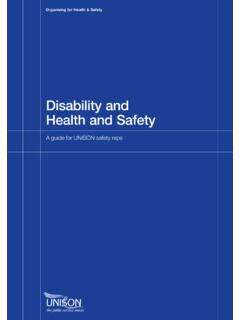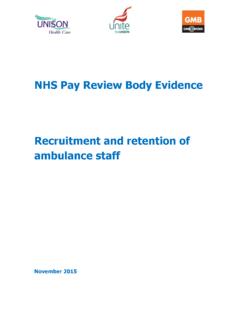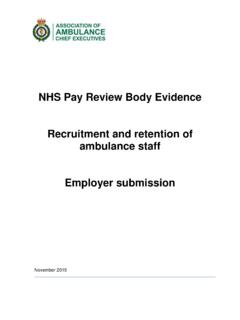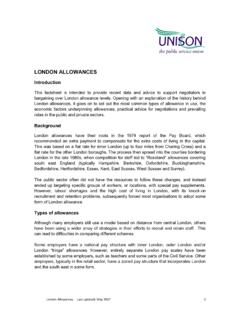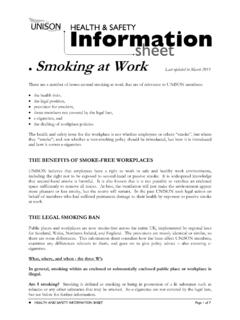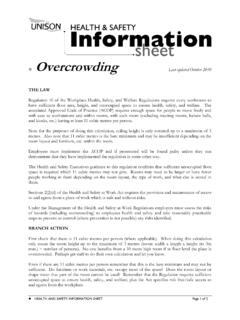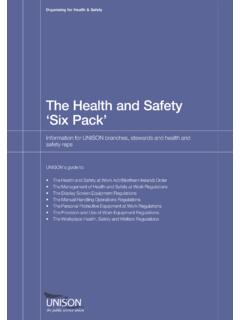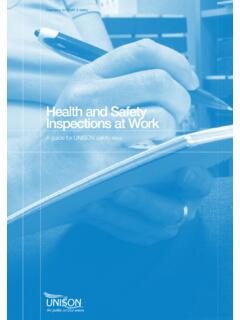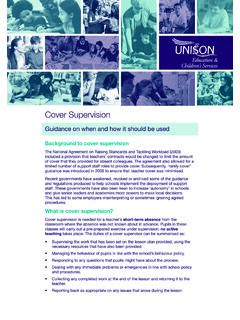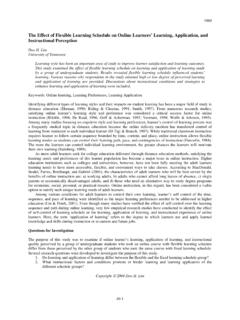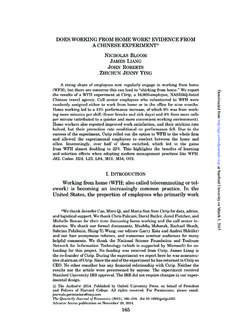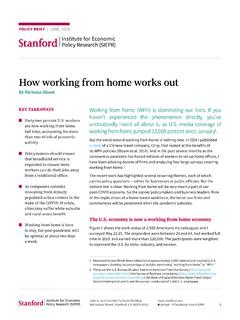Transcription of FLEXIBLE WORKING making it work - UNISON National
1 FLEXIBLE WORKING making it work Work life balance 3 Contents1. FLEXIBLE WORKING and work-life balance a new way of WORKING for negotiators 42. The context for FLEXIBLE WORKING 5 3. Understanding the options 64. Putting the business case to employers 85. Putting the business case to managers 9 6. Information gathering understanding your organisation 107. making FLEXIBLE WORKING a reality across your organisation 138. Helping an employee to make a request for FLEXIBLE WORKING 169. Piloting FLEXIBLE WORKING 18 Appendices: 1.
2 The legal framework 19 2. The right to request FLEXIBLE WORKING and parental leave 203. The right to request leave 214. Best practice examples 245. Managers FAQs 296. Sources of further information 32 This tool kit was produced in collaboration with WORKING Families FLEXIBLE WORKING making it work1. FLEXIBLE WORKING and work-life balance a new way of WORKING for negotiatorsDifferent managers have different relationships with trade unions, some good, and some bad; however, there are areas where managers and union representatives can work together without conflict.
3 Work-life balance has often proved to be one such area. Managers want fit, motivated and productive workforces who do their jobs well. UNISON wants its members to be treated fairly and to be given the chance to participate fully in the workplace without compromising their family commitments or general wellbeing. There is plenty of room for WORKING co-operatively with managers when it comes to work-life balance issues particularly as the benefits of a well organised scheme are very often genuinely mutually beneficial to both employee and employer.
4 FLEXIBLE WORKING is probably the best way for an organisation to offer work-life balance to its guide aims to assist you in your role as a UNISON branch officer or steward by highlighting potential areas of concern and offering advice on negotiations relating to FLEXIBLE WORKING . It is designed as both a source of information and a general negotiating tool to encourage you to find out what agreements and policies are already available within your workplace and to understand why this is an area where your role could be instrumental in shaping policy decisions.
5 It will equip you to begin to negotiate cultural change within your organisation and act as a toolkit for giving advice and handling individual requests to work flexibly from your members in light of new and changing , on the other hand, management is proposing to introduce FLEXIBLE WORKING , this guide will help you to help them introduce FLEXIBLE WORKING in a way that will benefit both the organisation and your a union steward you will often be in a better position than management to identify employees needs, where policies are not yet in place or inconsistently applied.
6 Your role can be vital in highlighting the mutual benefit of a consistently applied, well managed, appropriately targeted and fit for purpose FLEXIBLE WORKING policy. We know that work-life balance and flexibility are important for our members as they try to balance their desire to participate fully in their work and maintain a career while fulfilling their care responsibilities, pursuing outside interests, participating in their local community and looking after their own wellbeing. The case for introducing such policies has now been well established.
7 The benefits in terms of staff motivation, skills retention and dramatic reduction in stress-related sickness absence are now clear for both large and small employers. Change doesn t happen overnight and you might need support and guidance along the way. This guide has been designed to give you advice and information on negotiating on this issue. However, please remember that UNISON has a wealth of experience. If you are unsure of anything or need clarification speak to your branch colleagues or call on the expertise of regional officials.
8 Alternatively there is also a great deal of information that you can access on your own, and this guide includes links and references to those sources. UNISON wants its members to be treated fairly and to be given the chance to participate fully in the workplace without compromising their family commitments or general wellbeing. Work life balance 52. The context for FLEXIBLE workingIn recent years the government has begun to acknowledge the importance of work-life balance issues by introducing a variety of laws to support employees.
9 The concept of work-life balance, of which FLEXIBLE WORKING is a part, is that if people could improve the balance between the demands of their work and the demands of their home life they would be more satisfied at work and be more productive. Getting the balance wrong can mean health can suffer, work is less productive and relationships both at work and home begin to from simply complying with the legislation, many organisations are beginning to recognise the advantages of trying to meet the demand for FLEXIBLE WORKING .
10 FLEXIBLE WORKING practices have been seen to yield business benefits for the organisation and to play an important part in attracting new is not only parents who need FLEXIBLE WORKING . Current demographics and an ageing population mean that, at present, one in six employees have eldercare responsibilities this can only increase as the population ages and as the retirement age goes up. Non-carers in the workplace are demanding more FLEXIBLE ways of WORKING too, as they want time out of the workplace for other things, such as sport, education and public , the public sector has a better reputation than the private sector for FLEXIBLE WORKING practices.
